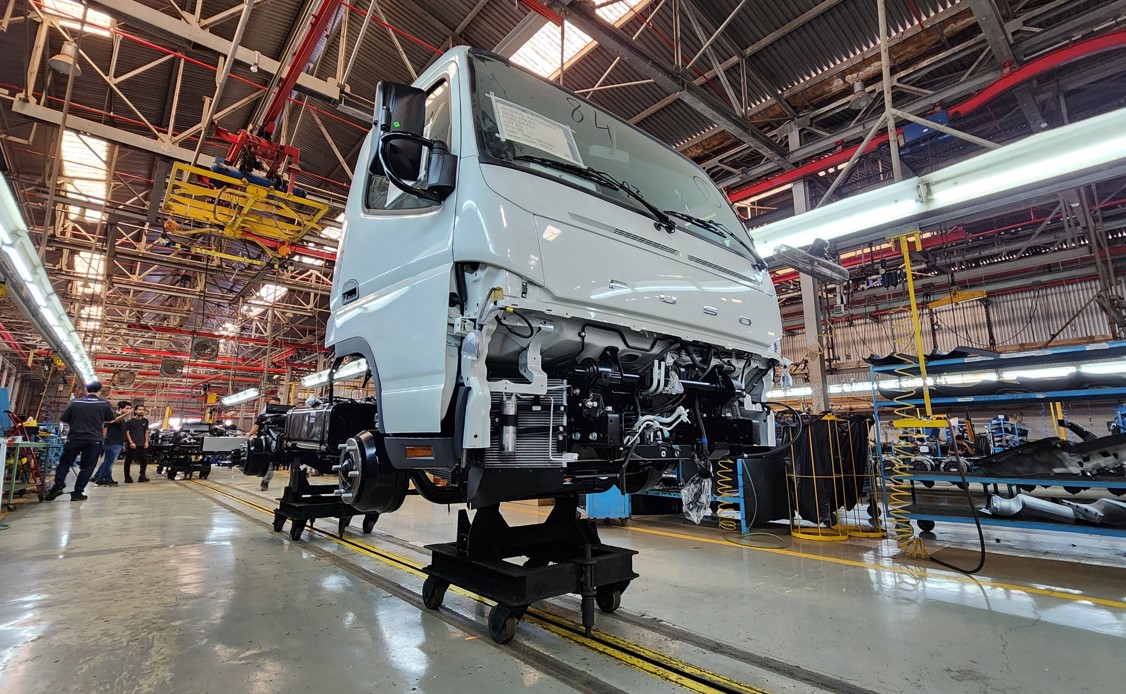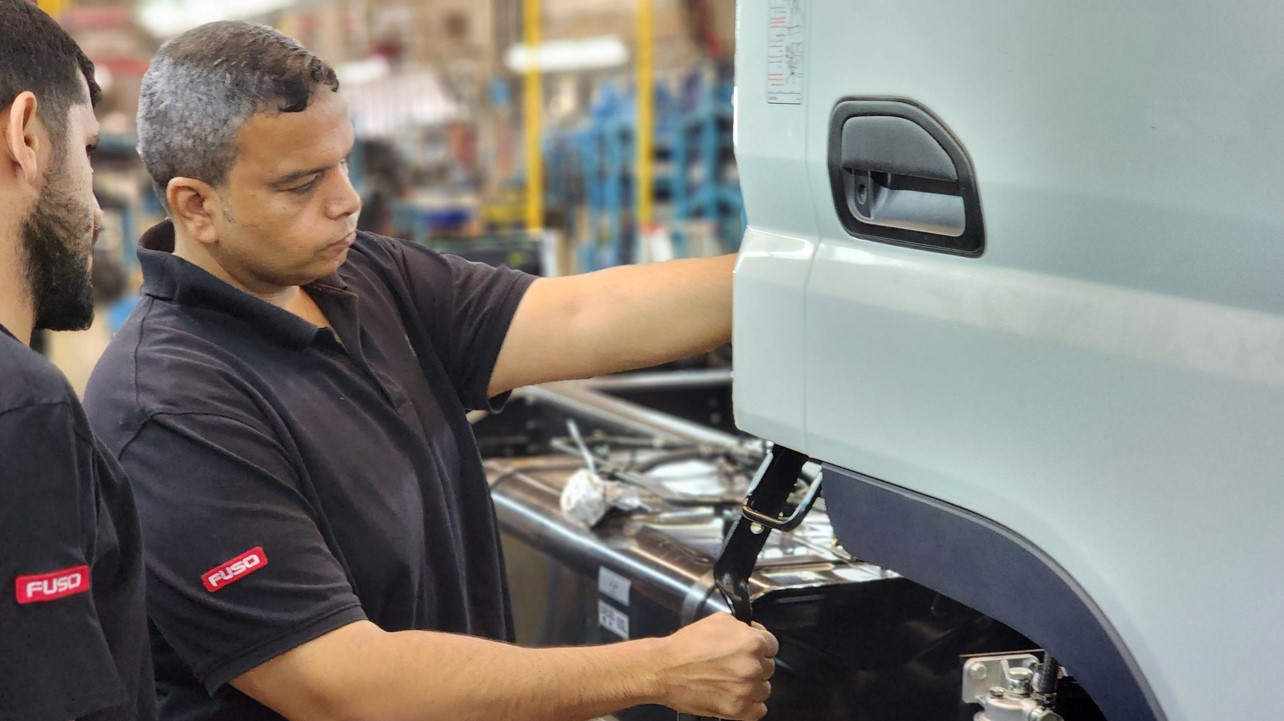Sorry. We did not find anything.

Local assembly of light-duty Canter trucks begins in Saudi Arabia for the first time
- General disributor Juffali Commercial Vehicles and NAI, its joint venture with Daimler Truck AG, begin assembling light-duty Canter trucks for the first time in Saudi Arabia
- KD assembly begins with the FE84 and FE85 Canter models
- Saudi Arabia is one of the largest volume FUSO markets in the MENA region
Kawasaki, Japan — Mitsubishi Fuso Truck and Bus Corporation (MFTBC; headquarters: Kawasaki City, Kanagawa Prefecture; President and CEO: Karl Deppen), is pleased to announce that the local assembly of knock-down (KD) Canter trucks has started for the first time in the Kingdom of Saudi Arabia. The assembly of the trucks is taking place in a facility operated by National Automobile Industries (NAI), a joint venture between general distributor Juffali Commercial Vehicles and Daimler Truck AG.
Local operations for the FUSO Canter began with four variants of the 6.5-tonne FE84 and three of the 7.2-tonne FE85. Equipped with the 4D33 engine, the light-duty truck serves key industries such as fast moving consumer goods and food distribution. The Canter has been a favorite of the Saudi market, due to their durability and reliability – necessary qualities to match the demanding conditions of region. On an average year, several thousand units of light-duty trucks are sold in Saudi Arabia alone. Further supported by a full range of light- to heavy-duty trucks and light-duty buses, the market is also among the largest for the FUSO brand in the MENA region in terms of unit sales, second only to the United Arab Emirates.
The KD kits for the FE84 and FE85 are exported out of the MFTBC Kawasaki Plant and shipped to the NAI facility in Jeddah, the second largest city in the country. The plant is well versed in the requirements needed to produce a high-quality truck, having started the assembly of Mercedes-Benz trucks almost half a century ago. Over the years, the plant and its majority share-holder and official FUSO distributor Juffali Commercial Vehicles has developed alongside the Kingdom, supplying rugged vehicles that have contributed to the now-burgeoning economy.
Saudi Arabia has been one of fastest-developing economies in the world in recent years, with the latest projections placing the GDP growth rate in 2022 at over 7%[1]. The Kingdom’s Vision 2030 which strategically outlines a diversification away from oil exports, is driven in part by multiple infrastructure and urban development mega-projects. Included in the framework are new destinations for sustainable tourism, public transportation networks, and industrial parks targeting future technologies. While FUSO vehicles have been in the market since 1973, with these large-scale public investments, MFTBC expects its trucks to play an even more important role in Saudi Arabia in the years ahead.
[1] https://www.imf.org/en/Countries/SAU
 A Canter in production at the Jeddah plant
A Canter in production at the Jeddah plant
 Employees assembling a FUSO Canter
Employees assembling a FUSO Canter
Juffali Commercial Vehicles at a Glance
Juffali Commercial Vehicles is the authorized general distributor in the Kingdom of Saudi Arabia of Daimler Truck AG, representing Mercedes-Benz trucks, FUSO trucks and buses, and Mercedes-Benz vans. The story began when E. A. Juffali & Brothers was established in 1946. Over the last 7 decades, Juffali has contributed to developing Saudi Arabia into the modern economy it is today. Juffali Commercial Vehicles now also includes the joint venture National Automobile Industry Company (NAI) as well as the Juffali Industrial Products Company. In 2018 Juffali Commercial Vehicles was appointed as the distributor of FUSO trucks and buses in the Kingdom, including service and genuine parts supply.
Daimler Truck Asia at a Glance
Daimler Truck Asia (DTA), under Daimler Truck AG, is an organizational unit that jointly operates Mitsubishi Fuso Truck and Bus Corporation (MFTBC) – an icon in the Japanese commercial vehicle industry with 90 years of history with its FUSO brand – and Daimler India Commercial Vehicles (DICV), an up and rising challenger in the Indian market. DTA adopts a strategic business model that allows its group entities to collaborate on product development, production, exports, sourcing and research activity to provide innovative, cutting-edge and best value products to customers. DTA’s vision is “to develop mobility solutions to embrace a better life for people and the planet,” and is aligned with Daimler Truck’s purpose, “For all who keep the world moving.”
MFTBC at a Glance
Based in Kawasaki, Japan, Mitsubishi Fuso Truck and Bus Corporation (MFTBC) is one of Asia’s leading commercial vehicle manufacturers, with 89.29% of its shares owned by Daimler Truck AG and 10.71% by various Mitsubishi group companies. An icon in the Japanese commercial vehicle industry with a longstanding history of 90 years with its FUSO brand, MFTBC manufactures a range of commercial vehicles including light, medium, and heavy-duty trucks and buses, and industrial engines for over 170 markets worldwide. In 2017, MFTBC introduced the eCanter, the first all-electric light-duty truck in series-production and in 2019, the Super Great – Japan’s first heavy-duty truck fitted with Level 2 Automated Driving Support Technology, a benchmark in the Japanese commercial vehicle market. MFTBC operates under the umbrella of Daimler Truck Asia, together with its partner organization Daimler India Commercial Vehicles (DICV) in India. This strategic unit allows the entities to collaborate on areas such as product development, parts sourcing and production to provide the best value to customers.
FUSO at a Glance
FUSO is a Daimler Truck brand, offering a range of commercial vehicles from light, medium, and heavy-duty trucks and buses, to industrial engines and connectivity solutions for over 170 markets worldwide. A longstanding landmark in Japan’s commercial vehicle landscape, the brand has leveraged Japanese quality and craftsmanship over the decades. FUSO is particularly renowned for its offerings in the light-duty segment. The Canter light-duty truck claims the top market share in various markets around the world. In 2017 the eCanter became the first series produced all-electric light-duty truck in Japan, establishing FUSO as a pioneer in eMobility. FUSO promises customers a “Future Together,” a bold claim that continues to drive the brand’s contributions to safe and sustainable transport. This year marks the 90th anniversary of the FUSO brand, another milestone in its continuing legacy of setting benchmarks in efficiency, safety, and comfort.
